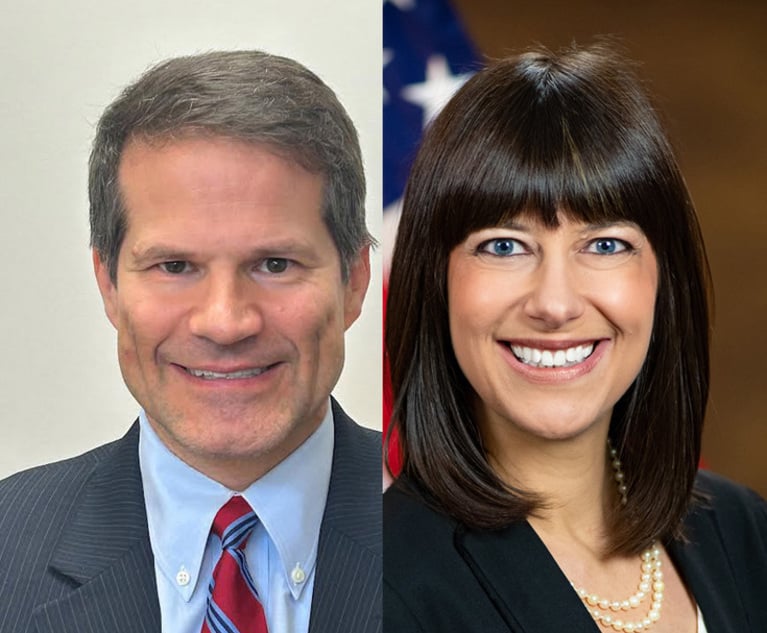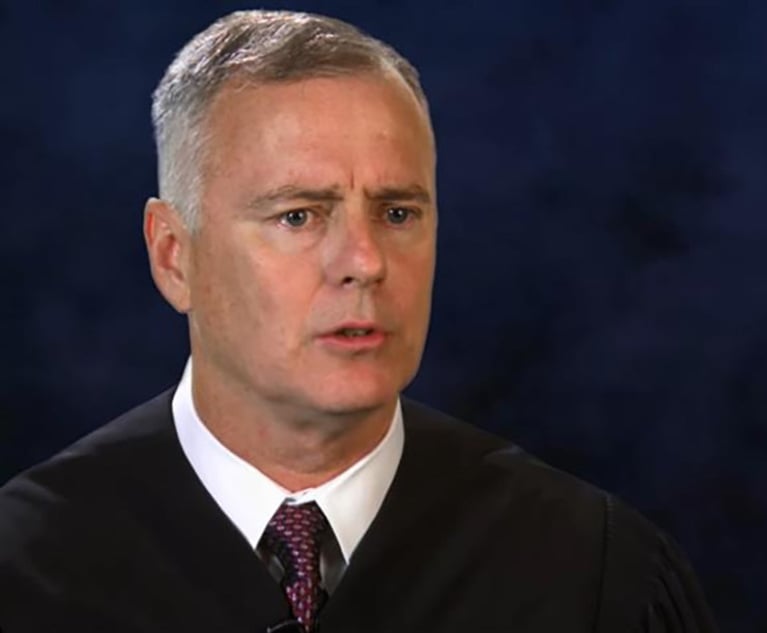Meet Chief Judge Roger Gregory, Fourth Circuit's Travel Ban Basher
Five things to know about Chief Judge Roger Gregory of the U.S. Court of Appeals for the Fourth Circuit.
February 16, 2018 at 10:28 AM
5 minute read
 Chief Judge Roger Gregory of the U.S. Court of Appeals for the Fourth Circuit. Credit: North Carolina Bar Association, via YouTube
Chief Judge Roger Gregory of the U.S. Court of Appeals for the Fourth Circuit. Credit: North Carolina Bar Association, via YouTube
Chief Judge Roger Gregory of the U.S. Court of Appeals for the Fourth Circuit this week wrote his second majority opinion upholding the block on President Donald Trump's travel ban.
Gregory led a 9-3 court affirming a lower court's injunction. He authored the majority opinion, which said the policy was tainted by animus toward Muslims. Gregory wrote a similar opinion last May, when the Fourth Circuit, again sitting en banc, upheld the same lower court's injunction against the March 6 travel ban executive order.
“On a fundamental level, the Proclamation second-guesses our nation's dedication to religious freedom and tolerance,” Gregory wrote in the latest decision.
The decision is the latest in a string of monumental opinions authored by the court's chief judge, including King v. Burwell, which upheld the legality of Affordable Care Act subsidies, and he was in the majority on Bostic v. Schaefer, which struck down Virginia's same-sex marriage ban.
Gregory became chief judge of the Fourth Circuit in 2016. At the time, he told the Richmond Times-Dispatch that although the job was “daunting,” he believed it was important to “stand up and take my turn.”
“As President Truman said, 'The difficulty about making a decision, wasn't the decision. The difficulty was not knowing all that time that you're right,'” Gregory said. “We have some incredible cases.”
Pro-tip: Maybe start citing the preamble of the Constitution. Gregory's a big fan. “I love the preamble to the Constitution. You know, no lawyers ever cite the preamble. They never do. They find the articles and the sections. But the preamble is a part of the Constitution. It starts it. It's powerful,” Gregory said in remarks last year at the North Carolina Bar Association's annual meeting. “What it said, after formation, in order to form a more perfect union, we intend to establish first justice. Before provide for the common welfare, and the defense, and happiness and all of those things, the first mandate of our Constitution is to establish justice. I don't know why people think that's an outlier.”
Here's some advice for young law students. Gregory in 2003 advised students that “intellect is fine, but without a passionate love for constitutional liberty it is without benefit.” And he offered this guidance last year: “The purpose of standing on broad shoulders is not to be seen. Instead, it is to see. To see out on the horizon that you might help some young woman or man or boy or girl see the potholes and pitfalls that you have been over. You might say, no, you might want to go another way, you want to rethink that.”
Yes, Gregory writes opinions for a living—but on the side he's a playwright. Gregory is the artistic director of the drama ministry at Good Shepherd Baptist Church in Petersburg, Virginia. “I love it. Theater is fun, a lot of fun,” he once said. Gregory reportedly played the role of Rev. Sykes in Harper Lee's “To Kill a Mockingbird” at the Virginia Repertory Theatre. “I was Rev. Sykes, who delivered my favorite line,” Gregory told the Times-Dispatch. Sykes tells Atticus Finch's daughter, as the lawyer is leaving court: “Stand up, Scout, your father's passing,” Gregory told the newspaper.
Gregory founded his own firm—with a former Virginia governor. Gregory came to the bench after years in private practice. He first worked for the Detroit firm Butzel, Long, Gust, Klein & Van Zile following his graduation from the University of Michigan law school in 1978. Later, he moved to Richmond and worked at Hunton & Williams. In 1982, he and L. Douglas Wilder, a former Virginia governor, created the firm of Wilder & Gregory. The firm is now the minority-owned Harrell & Chambliss.
And then he was appointed by two presidents. Gregory, appointed by President Bill Clinton in 2000, was the first African-American judge to sit on the Fourth Circuit. The Republican majority in the Senate refused to confirm him, so Clinton appointed Gregory while the Senate was in recess, bypassing confirmation until the end of the next session of Congress. President George W. Bush renominated Gregory the next year as his first nominee to the Fourth Circuit. Gregory recorded this video in 2012 about his path to the bench.
|This content has been archived. It is available through our partners, LexisNexis® and Bloomberg Law.
To view this content, please continue to their sites.
Not a Lexis Subscriber?
Subscribe Now
Not a Bloomberg Law Subscriber?
Subscribe Now
NOT FOR REPRINT
© 2024 ALM Global, LLC, All Rights Reserved. Request academic re-use from www.copyright.com. All other uses, submit a request to [email protected]. For more information visit Asset & Logo Licensing.
You Might Like
View All

Trump's Solicitor General Expected to 'Flip' Prelogar's Positions at Supreme Court

Auditor Finds 'Significant Deficiency' in FTC Accounting to Tune of $7M
4 minute read
Texas Court Invalidates SEC’s Dealer Rule, Siding with Crypto Advocates
3 minute readTrending Stories
- 1Gibson Dunn Sued By Crypto Client After Lateral Hire Causes Conflict of Interest
- 2Trump's Solicitor General Expected to 'Flip' Prelogar's Positions at Supreme Court
- 3Pharmacy Lawyers See Promise in NY Regulator's Curbs on PBM Industry
- 4Outgoing USPTO Director Kathi Vidal: ‘We All Want the Country to Be in a Better Place’
- 5Supreme Court Will Review Constitutionality Of FCC's Universal Service Fund
Who Got The Work
Michael G. Bongiorno, Andrew Scott Dulberg and Elizabeth E. Driscoll from Wilmer Cutler Pickering Hale and Dorr have stepped in to represent Symbotic Inc., an A.I.-enabled technology platform that focuses on increasing supply chain efficiency, and other defendants in a pending shareholder derivative lawsuit. The case, filed Oct. 2 in Massachusetts District Court by the Brown Law Firm on behalf of Stephen Austen, accuses certain officers and directors of misleading investors in regard to Symbotic's potential for margin growth by failing to disclose that the company was not equipped to timely deploy its systems or manage expenses through project delays. The case, assigned to U.S. District Judge Nathaniel M. Gorton, is 1:24-cv-12522, Austen v. Cohen et al.
Who Got The Work
Edmund Polubinski and Marie Killmond of Davis Polk & Wardwell have entered appearances for data platform software development company MongoDB and other defendants in a pending shareholder derivative lawsuit. The action, filed Oct. 7 in New York Southern District Court by the Brown Law Firm, accuses the company's directors and/or officers of falsely expressing confidence in the company’s restructuring of its sales incentive plan and downplaying the severity of decreases in its upfront commitments. The case is 1:24-cv-07594, Roy v. Ittycheria et al.
Who Got The Work
Amy O. Bruchs and Kurt F. Ellison of Michael Best & Friedrich have entered appearances for Epic Systems Corp. in a pending employment discrimination lawsuit. The suit was filed Sept. 7 in Wisconsin Western District Court by Levine Eisberner LLC and Siri & Glimstad on behalf of a project manager who claims that he was wrongfully terminated after applying for a religious exemption to the defendant's COVID-19 vaccine mandate. The case, assigned to U.S. Magistrate Judge Anita Marie Boor, is 3:24-cv-00630, Secker, Nathan v. Epic Systems Corporation.
Who Got The Work
David X. Sullivan, Thomas J. Finn and Gregory A. Hall from McCarter & English have entered appearances for Sunrun Installation Services in a pending civil rights lawsuit. The complaint was filed Sept. 4 in Connecticut District Court by attorney Robert M. Berke on behalf of former employee George Edward Steins, who was arrested and charged with employing an unregistered home improvement salesperson. The complaint alleges that had Sunrun informed the Connecticut Department of Consumer Protection that the plaintiff's employment had ended in 2017 and that he no longer held Sunrun's home improvement contractor license, he would not have been hit with charges, which were dismissed in May 2024. The case, assigned to U.S. District Judge Jeffrey A. Meyer, is 3:24-cv-01423, Steins v. Sunrun, Inc. et al.
Who Got The Work
Greenberg Traurig shareholder Joshua L. Raskin has entered an appearance for boohoo.com UK Ltd. in a pending patent infringement lawsuit. The suit, filed Sept. 3 in Texas Eastern District Court by Rozier Hardt McDonough on behalf of Alto Dynamics, asserts five patents related to an online shopping platform. The case, assigned to U.S. District Judge Rodney Gilstrap, is 2:24-cv-00719, Alto Dynamics, LLC v. boohoo.com UK Limited.
Featured Firms
Law Offices of Gary Martin Hays & Associates, P.C.
(470) 294-1674
Law Offices of Mark E. Salomone
(857) 444-6468
Smith & Hassler
(713) 739-1250








